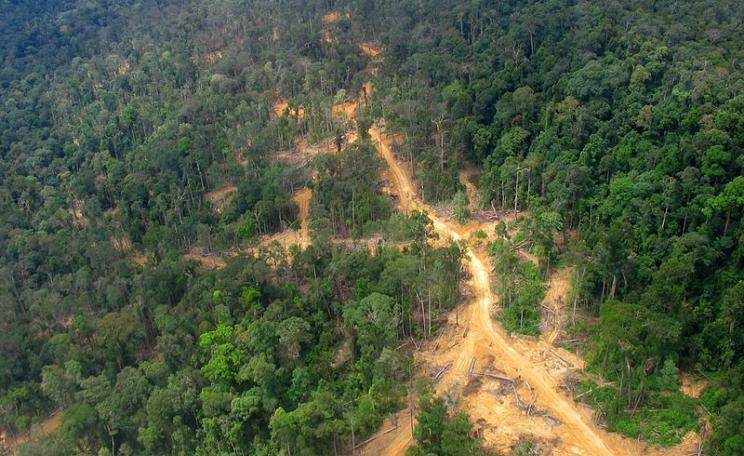I won't give away the details, but given the number of extraordinary stories about REDD in Papua New Guinea, it is perhaps only a matter of time before something like this actually happens.
It's the end of the decade. Nearly 30 years of United Nations negotiations have left us with nothing more than REDD and piecemeal carbon markets to address climate change. The UN has set up a Global Carbon Markets Organisation (GCMO) to try to make the carbon markets work.
This is the setting for Carbon Black, a new book by Australian environmental lawyer Declan Milling. This is a conspiracy thriller that plays out to the background of the world's failure to address climate change.
Emil Pfeffer, the book's protagonist, is the Director of Market Integrity at the GCMO. He's a former carbon trader who has become a regulator - poacher turned gamekeeper. He describes the GCMO as
"neither a toothless tiger, nor is it a restriction on the proper operation of the carbon markets ... The GCMO is here, to ensure a smooth running, fair, transparent and efficient carbon market for all."
It's all mysteriously plausible
Pfeffer explains this during a presentation at C-World International Match-making for the New Global Carbon Trade Conference and Trade Fair that takes place in Cologne, Germany.
While neither the GCMO nor C-World exist (yet), none of this sounds too far removed from today's reality. Pfeffer could be one of the characters at the real-life 'High-Level Carbon Pricing Dialogue' that took place in New York in September 2014.
Carbon Black follows Emil Pfeffer as he travels to Papua New Guinea from his office in Frankfurt am Main. His trip to Papua New Guinea follows the arrest of one of his colleagues. Pfeffer suspects a cover up and starts investigating.
It's an action packed story, with murder, sorcery, incompetence, militant anti-market protesters, Swiss bankers and fraud. And a couple of sex scenes that could be narrow misses for next year's Literary Review Bad Sex in Fiction award.
On the book's website, Milling emphasises that this is a work of fiction:
"Some of Emil Pfeffer's foibles could be my own, but for the most part his characteristics are his own, not those anyone of else. He is a work of fiction, as is the organisation for which he works, the other elements of the story, and as are all the other protagonists in Carbon Black."
It's only a matter of time before it really happens ...
The REDD project in Papua New Guinea is not like any REDD project (at least so far) anywhere in the world. I won't give away the details, but given the number of extraordinary stories about REDD in Papua New Guinea, it is perhaps only a matter of time before something like this actually happens.
I won't give away the details, but given the number of extraordinary stories about REDD in Papua New Guinea, it is perhaps only a matter of time before something like this actually happens.
The early days of REDD in Papua New Guinea featured a bizarre series of larger than life characters. Here's a small sample of them:
- a US-citizen born in PNG to missionary parents who travelled around the world promoting REDD;
- a "cock-fighting, carbon cowboy, kingpin tree tyrant";
- an Australian software programmer and carbon developer, whose company became embroiled in REDD scandals in PNG; and
- a director of the PNG Office of Climate Change who was suspended pending an investigation into a series of fake REDD credits.
More recently, we've seen a fake REDD project that appears to exist only in the mind of the director of the Australian company that wants to sell carbon credits from the project.
Several conflicts run through Carbon Black. Anti-carbon market protesters have set up a permanent camp outside the GCMO office. The arguments against carbon trading are brought up in the book, particularly by Dominik Baumann, Pfeffer's colleague who was an environmental campaigner as a student.
Then there is a tension between Pfeffer's new role as regulator of carbon markets and his former colleagues, the carbon traders. There's the conflict between the logging companies, the mining companies, the oil companies and those attempting (however ineffectually) to rein them in. And there are those who are protecting their economic interests in both business as usual and the carbon markets.
Pfeffer starts the book as a paper pushing bureaucrat. By the end he's an action hero. The book is an entertaining and gripping story.
It's the first part of a trilogy. In an interview on Suspense Radio, Milling says that in the second book Pfeffer is dealing with unfinished business and the third book will be "the denouement".
I'm looking forward to reading the next two books.
The book: 'Carbon Black' by Declan Milling is published by Clink Street Publishing. 312 pages, US$11.38, ISBN: 978-1909477360
Available on Amazon and direct from the author.
Chris Lang runs REDD-Monitor, which aims to facilitate discussion about the concept of reducing deforestation and forest degradation as a way of addressing climate change.
This article was originally published on REDD Monitor.







